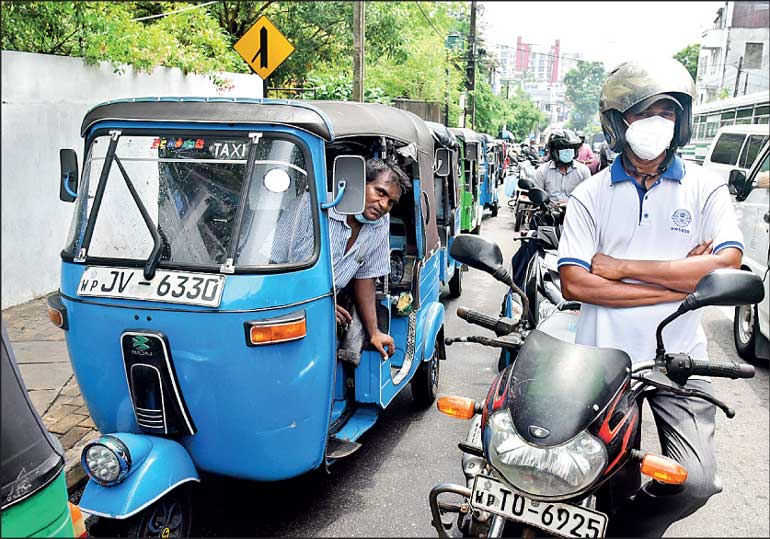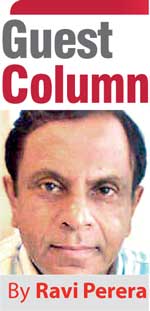Sunday Feb 15, 2026
Sunday Feb 15, 2026
Saturday, 11 June 2022 00:00 - - {{hitsCtrl.values.hits}}

Today, with no power, petrol or cooking gas, the pretence cannot be sustained any longer, our lives are teetering at the edge of a dark abyss
“Whereas once I was blind, now I can see…” – St. John 9:25

If you were to look for the positives in our dismal circumstances, the long queues for petrol could be considered the great equaliser. You may be an esteemed person in your community, a wealthy person, the owner of the service station maybe an old friend or his son and your son would have been classmates at an international school; but you bloody well stay in line and wait your turn for the petrol. Other vehicle owners who would have stayed in the queue for longer hours, will not stand for any hanky-panky. Even the attendants at the service stations, not particularly a punctilious lot usually, were mindful of the queue; first come, first served.
At times, during the long wait, another positive presents itself – an opportunity to meet congenial strangers, shared hardships binding us. I joined the petrol queue at the wee hour of 3 a.m.; waiting with me were several professionals, a retired police officer, senior private sector employees and a pregnant housewife who told me that her husband was at another queue with his diesel car. They already had two school going children whose transport was her responsibility. Her husband was in sales for a large company, his car was an essential tool of trade she said.
The lives of them all, tax paying, law abiding average people, have been turned into a dreadful existence, uncertain of obtaining even the very basics. Not that the Sri Lankan quality of life was enviable before, the very averageness of our statistical actualities does not permit it. In their availability as well as the quality of goods and services, we lag far behind. What you don’t know cannot make you unhappy, unaware of higher standards, we readily reconciled with what was available. However, until now, we got by. Today, with no power, petrol or cooking gas, the pretence cannot be sustained any longer, our lives are teetering at the edge of a dark abyss.
It is humiliating to think that this nightmare was created by the accumulated stupidities, blunders and the abusers of the very men we have been electing for 70 long years.
To put together the different opinions of those who were waiting with me in the petrol queue is not easy. They range from the profane to the philosophic. However, I would attempt to summarise some of the views expressed, presumably representative of the country’s mood today.
Clearly, in these few weeks many long held myths and illusions have died in the minds of the people.
No individual or institution exercising power in whatever form, whether lay or clerical, is exempt from the revulsion of the public. Gotabaya Rajapaksa, the incumbent President maybe exceptionally inept, however, realisation has dawned on many that since independence they have been deifying false gods. In different garbs the charlatans have appeared; top hat and tailcoat, coat and tie, national costume and scarf, the robe of spirituality or the formality of the officialdom; all leading to the burning crisis of today.
The extraordinary length of the average Sri Lankan political career makes the very same parliamentarians now promising new “solutions”, in reality, the creators of our intractable problems. Having trapped the nation into a two-party system, these careerists enjoy alternate bites at the cheery. Unless death intervenes, there is no retirement for them. Not only a life time in the limelight, the good things they crave so much; vehicles, houses, security, foreign travel, plush hotels, expensive foods; they deny themselves nothing, all at public expense!
Their greatest damage however is not easily perceptible, but far more deep going. By their unscrupulous conduct, these careerists have undermined the people’s faith in the system, making a mockery of the concept of democracy. The democratic system was never meant for the parody we have now; blatant nepotism, corruption and abuse of their mandate. In this country, we have had members of one family holding concurrently, the positions of president, prime minister, speaker and several cabinet ranks, including the vital portfolio of Finance. We have seen a leader of a political party, despite broad rejection in the country, holding that position for decades, on the strength of a party constitution adopted under his aegis. Turning the concept of representation upside down, the same person volunteered to become Prime Minister, of course to save the nation! No wonder that the nation, utterly disillusioned, wants nothing to do with him.
Even when the country has hit such lows, unable to pay for even its medicines, no elected body or person has moved to reduce their personal emoluments or benefits. We do not see any attempt to reduce costs, no attempt to auction off their vehicles, no attempt to waive off allowances or layoff personal staff. The huge lie, that their ‘work’ is vital, the country needs their expertise, must be continued.
It is typical of their methodology to reduce our catastrophe to a constitutional issue of the presidency, get rid of it and all will be good! The game is still in their control. When S.W.R.D. Bandaranaike set us on the path to becoming a nonentity among nations, he was Prime Minister. When his widow Sirima Bandaranaike made this country into a beggar’s colony, she was Prime Minister. When J.R. Jayewardene introduced his pernicious constitution, he was Prime Minister. The politicians are looking at the wrong place for the culprit, they only need to find a clean mirror to discover the source of all our ills!
Recently, in the mother of parliaments we saw David Cameron, the former British Prime Minister, bidding good bye to politics upon being narrowly defeated at a referendum sponsored by him on the issue of ‘Brexit’. This was in 2016, Cameron was only sixty years old then. Another country, another culture.
In truth, all political systems we have today owe their origins to other cultures and other histories. What grows well in one type of soil may struggle in another. What may come naturally to one way of thinking, may look awkward when interpreted by an altogether different mind-set. The mimic may constantly refer to Churchill, Erskine May or even Westminster principles, the effect is only roughish, if not comical. As our post- independence experiences have shown, without a supporting culture, without high standards in public life, without the appropriate personality, no system can have true meaning.
Since independence, we have bred only politics of patronage, dynasties, life time political careers; all this awash with corruption of every type.
Of course, the issue is never presented in such a stark manner. At every election, we see extra-terrestrial creatures descend to the contest. Not only are they as pure as driven snow, in intelligence and ability the contestants claim phenomenal standards. Election campaigns everywhere tend towards the overblown, our sloganeering is hyperbolic to the level of the absurd.
At different times we have been asked to vote for: the father who gave us rice (Dudley), mother to all (Sirima), philosophic king (JR), common man’s hero (Premadasa), the great white hope (Chandrika), the ultimate patriot (Mahinda), omniscient sage (Ranil) and the brilliant system changer (Gotabaya). We now know that father figures or mother figures are only a figment of our imagination. JR was no philosopher – going by his constitution not even a good legislator. Any scoundrel can pose off as a patriot.
One needs sound judgment to see through an all-knowing pose. Generally, to judge a person’s knowledge we must examine his scholastic output or his actions in that particular area of knowledge. Otherwise, any dabbler can claim expertise; lower the discernment of the public, higher the opportunities for a fake expert.
Standing before us are stark economic realities: a country which for 50 years has not been able to establish a noteworthy industrial base, does not possess globally competitive services and never achieved a breakthrough growth rate. We are told now that if the tourist numbers fall or the remittances of the blue collar workers in the gulf countries drop, the economy of this country will go spiralling down.
So fragile an economy received the final push under the much heralded Gotabaya Rajapaksa. Nonsensical leaders have led a nonplussed nation to hell’s door.
The tomfoolery of our politics reminds me of a celebrated essay of VS Naipaul, the Nobel prizewinning author. Titled “The Crocodiles of Yamoussoukro”, Naipaul wrote this longish piece of reportage after visiting the West African country of Ivory Coast, former French colony. Ivory Coast has been independent since 1960, a republic, with a presidential system of government. The country is about 125,000 square miles, carrying a population of approximately 26 million. Its official language is French. Ivory Coast’s per capita income is about $ 2,600.
“One of the names I had been given before coming out to the Ivory Coast was that of Georges Niangoran-Bouah. The note on him said: ‘Anthropologist, contactable at the institut d’Ethnosociologie, ‘at the university. He is around 55, world specialist on “Drummologie”, form of communication of tribal drums. Knows African art well, has a fantastic collection of Ashanti weights.
He sounded quite a figure. And, as often happens when, as a traveller, I am given the names of important local people, I was shy of getting in touch. But I mentioned his name to various people, and I found out fairly soon that Niangoran-Bouah was academically controversial, that if he was a world expert on Drummologie, it was because he had started the subject, and had in fact invented the word. Drummologie was apparently as controversial a university course as the one on African philosophy. Some people doubted whether either Drummologie or African philosophy existed.”
A lot of people in Sri Lanka have now begun to doubt the various “Drummologies” of our politics.
They are also realising that condemning the injustices of the present, may be the easier part; from blindness to sight, is a long hard journey.